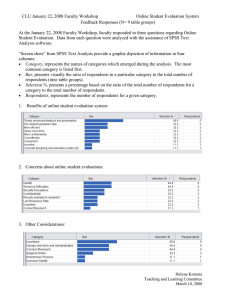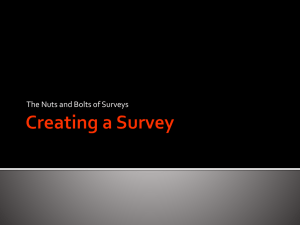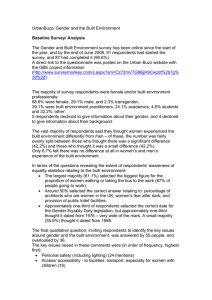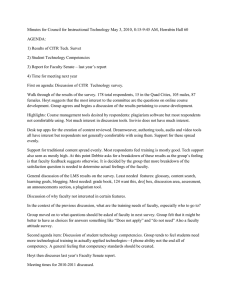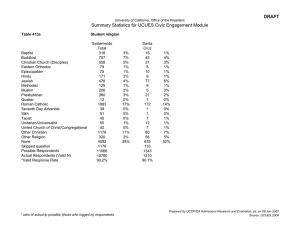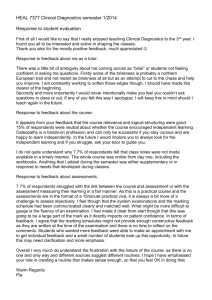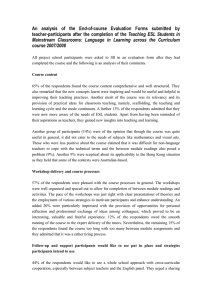Source: Primary Data, Figures in parenthesis are
advertisement
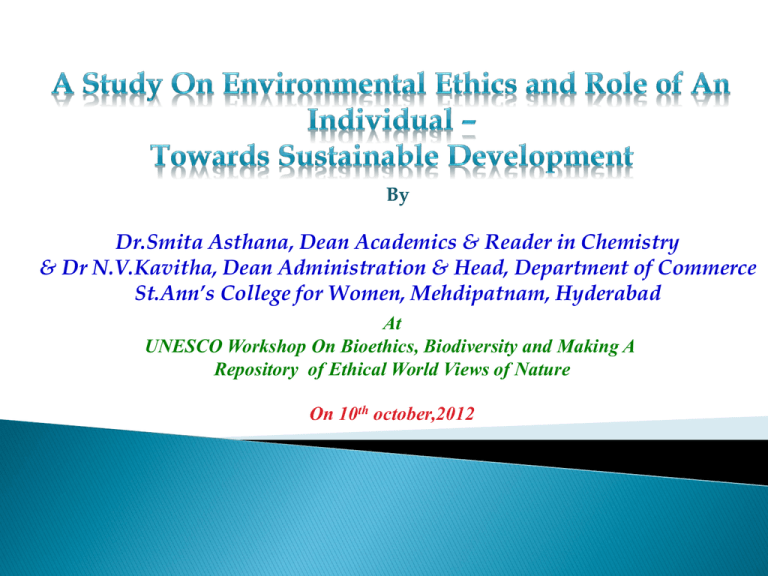
By
Dr.Smita Asthana, Dean Academics & Reader in Chemistry
& Dr N.V.Kavitha, Dean Administration & Head, Department of Commerce
St.Ann’s College for Women, Mehdipatnam, Hyderabad
At
UNESCO Workshop On Bioethics, Biodiversity and Making A
Repository of Ethical World Views of Nature
On 10th october,2012
Philosophy
Intrinsic Value
Instrumental Value
Role of Humans
Anthropocentric
Humans
Nature
Masters
Stewardship
Humans and
Nature
Tools
Caretakers
Biocentric
Species
Abiotic Nature
One of many
Ecocentric
Processes
Individuals
Destroyers
Ecofeminist
Relationships
Roles
Caregivers
MAN AS STEWARD
A sense of responsibility to manage and care for the environment
4/13/2015
2
Moral responsibility is nothing more
than our capacity to be human and being
able to take care of everything around us.
“Earth provides enough to satisfy every man's needs, but not every man's greed.”
― Mahatma Gandhi
4/13/2015
3
THE OBJECTIVES OF THE SURVEY
A survey was conducted with the help of a structured questionnaire with three
broad heads –
1. “I Know” to examine the awareness/understanding level of the select
respondents,
2. “I believe” to know the perceptions of students with regards to the core
components of environmental ethics and their stake towards environmental
issues.
3.3. “I Do” to judge the extent to which knowledge is translated into actions
4/13/2015
4
I know about
A lot A little No
(%)
(%)
idea
(%)
Chemical Pesticides
5
68
27
Genetically
modified 2
foods
Melting of glaciers
10
43
55
75
15
Ozone hole
14
78
8
Carbon footprint
8
65
27
Organic farming
23
74
3
Kyoto protocol
12
65
23
COP - 11
28
48
24
Source: Primary Data
Graph – A
more than 50% of the respondents are moderately aware of the current issues
related to environment and keep themselves updated to some extent .
4/13/2015
5
I believe that
Strongly
Disagree
The earth belongs equally to humans, animals, 18{8}
plants and other life forms
Disagree
Neither
Agree
13{6}
31{14}
96{44}
Strongly
Agree
62{28}
Technology can solve all our problems
15{7}
18{8}
20{9}
105{48}
62{28}
Environment has to be compromised for growth
93{42}
44{20}
35{16}
22{10}
26{12}
Environment
protection
is
rich
countries 53{24}
responsibility
Environment education should be taught at all 9{4}
levels of education
101{46}
31{14}
22{10}
13{6}
26{12}
44{20}
115{52}
26{12}
Simple lifestyle will help protecting environment
9{4}
18{8}
18{8}
127{52}
48{22}
Humans are responsible for all natural calamities
20{9}
48{22}
38{19}
89{40}
15{7}
20{9}
18{8}
101{46}
56{30}
Sacrifices have to be made by everyone to save the 15{7}
earth.
Source: Primary Data, Figures in parenthesis are %age of respondents
4/13/2015
6
I Do the following
Yes
No
Don’t
Know
Bought any product that is environment friendly
22{10%} 158{72%}
40{18%}
Grown anything in your backyard
48{22%} 145{66%}
27{12%}
Contributed money or time to an environmental
cause
84{38%} 114{52%}
22{10%}
Made efforts about saving water
37{17%} 154{70%}
29{13%}
Used less fuel to protect the environment
35{16%} 146{66%}
49 {22%}
Stopped eating certain foods because they are
imported
18{8%} 167{76%}
35{16%}
Educated people around about taking care of
environment
62{28}
53{24%}
105{48%}
Source: Primary Data, Figures in parenthesis are %age of respondents
4/13/2015
7
The results from ‘I know’ revealed that there is need for
greater awareness about environmental concerns,
the understanding of its gravity,
consequences in future and
the action that has to be taken today.
Environmental education has an important role to play in the promotion
of environmental awareness . The knowledge base of a society is one
important aspect of its capacity to address and cope with environmental
issues.
4/13/2015
8
FINDINGS OF THE STUDY – CONTD.
The ‘ I believe’ segment revealed
the respondents’ understanding of the need to coexist,
the pitfalls of overdependence on technology and
the role every individual, society has to play and decisions
that have to be taken today for future.
Coming generations will also be affected by these decisions and
the extent to which they have addressed concerns such as the
depletion of resources, the loss of biodiversity, and long-lived
radioactive wastes from generation of nuclear energy.
4/13/2015
9
FINDINGS OF THE STUDY – CONTD.
‘I do’ segment impresses the need to translate knowledge into
plans and actions. Not much seems to be done.
The real problem may lie not in the kinds of environmental
education being imparted, but rather in the difficulty involved in
translating environmental value commitments into action of any
kind, be it in terms of lifestyle adjustments or
social activism.
Young people are often the target of commercials and peer pressure
not just because of any disposable income they are likely to possess
and the influence they have on money spenders, but because
manufacturers have a vested interest in establishing highconsumption patterns that will last a lifetime albeit at a cost to the
environment.
4/13/2015
10
Environment education should help the student to understand the
personal responsibility for the environment and the concept of
stewardship.
Our task as environmental educators in the twenty first century is to
assist the overall process –
by striving to implement programmes of education that inform our
students the complexities of the environment in which they are
growing up, empower them to address environment and development
issues in their lives and provide them with opportunities to be
inspired by the joys, wonder and mysteries of the natural world and
human achievement.
4/13/2015
11
“The earth, the air, the land and the water are not am
inheritance from our fore fathers but on loan from our
children. So we have to handover to them at least as it
was handed over to us.”
-Mahatma Ghandhi
It is quite obvious that an individual has to play the vital role for the
protection of environment and the sustainable development concept
will remain in existence if only the individual has taken initiative
4/13/2015
12
4/13/2015
13

